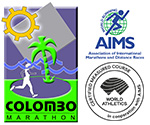The world running organisation the Association of International Marathons and Distance Races (AIMS) is delighted to announce that the Kenyan athlete Joyciline Jepkosgei has been presented the AIMS World Record Award in recognition of her world record breaking Half Marathon time of 1:04:52 set in the Sportisimo Prague Half Marathon on 1 April 2017.
Today (Friday 20 October 2017) in Valencia, Spain, Joyciline’s record breaking accomplishment was recognised by AIMS during a presentation in advance of the Medio Maraton Valencia Trinidad Alfonso EDP in which she is scheduled to compete.
President of AIMS and the Race Director of the Medio Maraton Valencia Trinidad Alfonso EDP, Paco Borao presented Joyciline with her award.
Joyciline (23) beat the previous record of 1:05:06, set seven weeks earlier by her compatriot Peres Jepchirchir in the Ras Al Khaimah Half Marathon (UAE), by 14 seconds.
Joyciline’s time of 1:04:52 has been officially recognised as the world record by the IAAF (International Association of Athletics Federations) and by AIMS (Association of International Marathons and Distance Races which represents over 425 distance running events in 112 countries and territories). AIMS set the world record criteria for performances on the road later adopted by the IAAF.
Her form has been outstanding in 2017. While setting the half marathon world record in Prague, she also set record times for the 10k (30:04), 15k (45:37) and 20k (1:01:25).
She returned to Prague in September 2017 for the Prague Grand Prix 10km in which she became the first woman in history to run a 10km road race in under 30 minutes - by recording a time of 29:43 (subject to ratification by the IAAF).
AIMS have been awarding athletes in recognition of world record breaking performances since 1985. This is the first time that Joyciline has been recognised by AIMS.
AIMS President & Race Director of the Medio Maraton Valencia Trinidad Alfonso EDP Paco Borao commented: “It is a great honour to recognise Joyciline’s record breaking achievement with an AIMS World Record award. We are delighted to welcome Joyciline to our event in Valencia. We present this award to Joyciline on behalf of the 439 AIMS members in 114 countries and territories.”
Joyciline Jepkosgei commented: “I am very happy to be recognised by AIMS and their members around the world and I would like to thank them for presenting me with this illustrious award. Also, I would like to thank AIMS, its members and sponsors who provide the network that enables distance running to flourish around the world and provide runners like me the opportunities to be the best we can be.”
AIMS proposed the technical criteria for World Records on the road that the IAAF has adopted for prescribed distances.
The full conditions to be satisfied are:
a) The event must be sanctioned either by the IAAF and/or the National Federation and conducted under IAAF Rules.
b) The athlete achieving the IAAF Road World Record must be eligible to compete under IAAF Rules.
c) The course must be measured by an “A” or “B” IAAF/AIMS approved measurer as defined in IAAF Rule 240.3.
d) The start and finish points on a course, measured along a straight line between them, shall not be further apart than 50% of the race distance.
e) The decrease in elevation between the start and finish shall not exceed an average of one in a thousand, i.e. 1m per km.
f) Either the course measurer that certified the course or another “A” or “B” measurer in possession of the complete measurement data and maps must validate that the course measured was the course run by riding in the lead vehicle.
g) The course must be verified on site (i.e. within two weeks before, on the day of the race or as soon as practical after the race), preferably by a different IAAF/AIMS “A” measurer from the one that did the original measurement.
h) The athlete must undergo a doping control on the date of the race.
i) For the Road Relay, the race should be run in stages of 5km, 10km, 5km, 10km, 5km, 7.195km.
Road World Records set at intermediate distances within a race must comply with the above conditions and be timed according to IAAF Rules. The intermediate distances must have been measured and marked during the course measurement.
It is recommended that Member Federations adopt the Rules of the IAAF for the conduct of their own athletic competitions.

